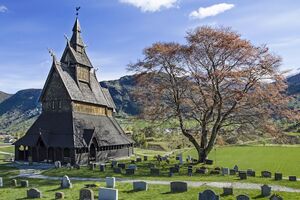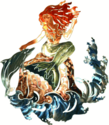Disitru
 | |
 | |
| Regions with significant populations | |
|---|---|
| 18,231,116 | |
| Languages | |
| Old Hallic (liturgical) Tuske, Crethian, Svaldish, Noregrin | |
Dísitrú is an Tyric henotheistic and monolatrist religion based on the traditional beliefs and practices of the Hallanic peoples
Etymology and meaning
Beliefs
Concept of God
Dísitrú has a complex system of godhood, with it being considered monotheistic, polytheistic, pandeismic and monismic, among others. Its concept of God and godhood is variant upon the tradition followed. Followers of Dísitrú often refer to it as henotheistic (i.e., involving devotion to a single god while accepting the existence of others).
A similar concept of divinity is shared between all traditions. It is held that the gods (tívar) came into being shortly after the creation of the universe. There exists no singular creation myth and the reason for creation and the existence of a creator is disputed among traditions. The gods are held as possessing the divine spark, though they are not omniscient, omnipotent or held to be wholly benevolent.
In the Sennleið tradition the Tívamál, the Time of Gods, has long since passed. Followers of this tradition believe that the event known as Ragnarök saw the deaths of many gods, with many others ascending to Valhöll. Týr became the Æztrhás, the supreme god charged with fulfilling all the duties expected of the gods. The Fallatýs (Descent of Týr) occurred when Týr descended to the Hel and bargained for the release of the slain gods, in return for taking charge of the underworld. His daughter, Damen (The Dame), took his place as the supreme god while the other gods ascended to Valhöll, and will remain the supreme god until Mánimál, when the world will be reborn as a paradise under the deity known as Vít.
Practices
Scripture
Law
Society
Marriage
Helgtband - Permanent marriage, family-oriented, only one allowed, religious, divorce difficult, children 'higher status' (archaic)
Handfesta - 'Temporary' marriage, contractual, polygamy allowed (with restrictions), semi-religious (depends on state), same-sex marriage depends on state, 'lower status' children (archaic)
Eskerhlaup - Modern term means cohabitation + common-law marriage, civil, older term also included concubinage, polgyamy allowed, legal protections depend on state, same-sex allowed, 'lowest status' children (archaic)



